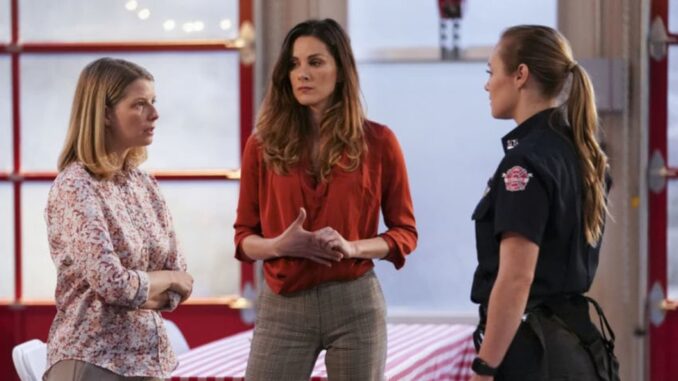
The Weight of Words, The Weight of Loss: Carina Confronts Maya on Station 19
The harsh, sterile light of the Station 19 locker room seemed to amplify the tension radiating from Carina DeLuca. It wasn't the usual, playful exasperation she often felt towards her wife, Maya Bishop. This was something heavier, a volatile mix of grief, frustration, and the agonizing recognition of a pattern she knew all too well. Her father's recent death hung heavy in the air, not just for her, but, frustratingly, for Maya too, who was stubbornly avoiding her own pain. The confrontation brewing was inevitable, a collision course forged by Carina's grief and Maya's steadfast commitment to denial.
Carina’s grief was multifaceted, a complex tapestry woven with threads of love, regret, and the indelible mark her father, Vincenzo, had left on her life. He was a complex man, charming and flawed, a renowned surgeon who struggled with his own demons. His work ethic was legendary, but it came at the price of emotional distance, leaving Carina and her brother, Andrew, yearning for a connection he often seemed incapable of providing. Now, with his death, Carina was forced to confront the unsaid words, the unfulfilled expectations, and the complicated legacy he left behind. She felt the familiar pull of his ambition in her own drive, the echo of his self-reliance in her independent spirit. But she also felt the sting of his absence, a void that no amount of professional success could ever fill.
Maya, on the other hand, was a master of deflection. Carina watched her meticulously fold towels, the rhythmic movements a shield against the vulnerability threatening to crack her carefully constructed facade of strength. Maya’s own childhood traumas were a constant, silent presence in their relationship, a shadow that often dictated her reactions. Carina knew Maya feared weakness, equated vulnerability with failure. She saw the familiar signs: the rigid posture, the clipped responses, the unwavering commitment to control – all telltale indicators that Maya was pushing down something profound.
“Maya,” Carina began, her voice softer than she intended. “We need to talk.”
Maya didn’t look up. “About what? My shift starts in five.”
“About your grief,” Carina insisted, her Italian accent thickening with emotion. “About my father. About… everything.”
The tension in the locker room solidified. Maya finally looked up, her eyes guarded. “I’m fine, Carina. You know I’m fine. I’m handling it.”
Carina’s patience snapped. “Handling it? You’re pretending it’s not happening! You’re throwing yourself into work, pushing everyone away. You think I don't see you?”
The accusation hung in the air, heavy with unspoken history. Carina recognized the pattern because she’d seen it before, in her own family, in Andrew’s desperate attempts to prove himself, in Vincenzo’s unwavering focus on his career. Denial was a familiar coping mechanism, a shield against the pain that threatened to overwhelm.
“I’m… being productive,” Maya stammered, her voice losing its usual steely edge. “Isn’t that what you always encourage?”
“There’s a difference between being productive and running away,” Carina countered, her voice rising slightly. “My father’s death has triggered something in you, Maya. You’re so afraid of feeling, so afraid of being vulnerable, that you’re shutting me out.”
She gestured towards the locker room, towards the sterile environment that seemed to reflect the emotional emptiness Maya was cultivating. “This isn’t a competition, Maya. Grief isn’t something you can outrun. You need to allow yourself to feel it, to process it. For yourself, and for us.”
Maya remained silent, her gaze fixed on the floor. Carina saw the flicker of vulnerability in her eyes, the cracks in her armor, and her heart ached. She knew this wasn’t about Vincenzo. It was about Maya’s own unresolved trauma, about the fear of confronting the darkness she’d spent years suppressing.
“My father,” Carina continued, her voice softening again, “he wasn’t perfect. He made mistakes. He wasn’t always there for me. But he was my father. And I loved him. And it hurts, Maya. It hurts so much. And you don’t have to be strong for me right now. You just have to be there.”
The raw honesty in Carina’s voice finally seemed to break through. Maya’s shoulders slumped, and a single tear traced a path down her cheek. She finally looked up, her eyes filled with a pain that mirrored Carina’s own.
“I… I don’t know how,” she whispered, her voice barely audible.
Carina stepped forward, wrapping her arms around Maya. “We’ll figure it out together,” she said, her voice thick with emotion. “We always do.”
The embrace was a fragile truce, a tentative step towards healing. Carina knew the road ahead wouldn’t be easy. Confronting grief was a messy, unpredictable process, especially for someone like Maya who clung so tightly to control. But in that moment, surrounded by the cold steel of the locker room, Carina found a flicker of hope. Hope that Maya could learn to embrace her vulnerability, hope that they could navigate the complexities of grief and trauma together, and hope that their love could be strong enough to withstand the weight of loss and the legacy of their pasts. The weight of words, the weight of loss, hung heavy in the air, but now, perhaps, they could carry it together.